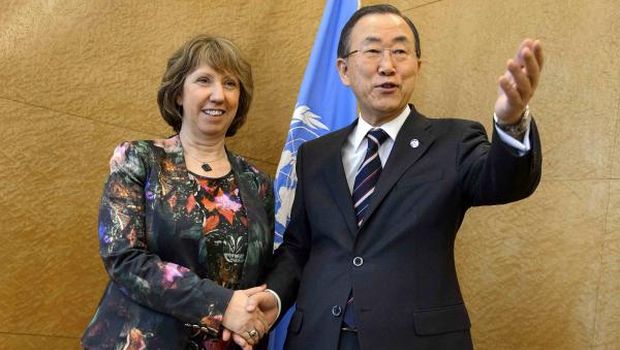
EU foreign policy chief Catherine Ashton and UN Secretary-General Ban Ki-moon shake hands before a bilateral meeting at the United Nations offices in Geneva on January 21, 2014, ahead of the Geneva II conference in Montreux. (Reuters/Fabrice Coffrini/Pool)
Brussels, Asharq Al-Awsat—The European Union reaffirmed its support for the Geneva II conference on the Syrian crisis on Monday as controversy continued to surround the talks, especially following the UN’s withdrawal of UN Secretary-general Ban Ki-moon’s invitation to Iran to attend.
The EU issued a statement on Monday expressing its “full support” for the conference, and said that it should be a “first step in a process that will lead to a political solution to the conflict.”
The EU statement said the aim of the conference was to form a “consensual” transitional authority with full executive powers, including responsibility for the police, army and intelligence services.
This conforms to the findings of a previous international conference on the Syrian conflict, Geneva I, held in June 2012, which called for a negotiated end to the conflict in Syria and the formation of an interim government with full sovereign powers.
The US and its allies have attempted to establish acceptance of the Geneva I proposals as a precondition for attending Geneva II. Iran’s refusal to accept them led to US and European opposition to its presence at the talks.
The EU condemned the escalation of random attacks on the opposition by the Syrian government, including the use of Scud missiles, bombs, air strikes and artillery, especially in Aleppo, and said they were “compromising the political solution.”
EU foreign ministers meeting in Brussels expressed concern about the spread of extremism and radical groups, including the Al-Nusra Front, and said its participation in the conflict “posed a threat to regional and international peace, stability and security.”
They demanded that all efforts be directed at “rebuilding the country and freeing it from its oppressive past, as well as preserving its religious, ethnic, and cultural traditions, and guaranteeing coexistence and respect for human rights.”
The EU also expressed concern about the welfare of ethnic and religious minorities, including Christians, and vowed to continue to defend human rights and ensure that officials would be held accountable for human rights violations in Syria. It also called for officials implicated in crimes against humanity to be held accountable.
The EU called on all foreign fighters, including Lebanese fighters from Hezbollah, to leave Syria immediately. It warned of the danger posed by EU and foreign nationals traveling to Syria to fight, as well as the links they might form with radical groups before returning to Europe.
It called on Syria’s neighboring states to be “vigilant and take necessary measures to stop the flow of foreign fighters into and out of Syria.”
In reply to a question by Asharq Al-Awsat, EU foreign affairs chief Catherine Ashton said: “We support the United Nations and Arab League envoy Lakhdar Brahimi on [the issue of] participation in the conference. What is important regarding Geneva II is the stage which will follow it, because the discussions will include many different parties, and we must focus on ensuring the negotiations are a success.”
“The proposals that will be put forward must take into account the results of Geneva I, and this is very important. Then we must support Brahimi’s efforts to find a way to resolve the important issues and build confidence between different parties in order to achieve a ceasefire and facilitate the delivery of humanitarian aid, and all this within a framework of a political solution,” Ashton added.
Belgian Minister of Foreign Affairs Didier Reynders told Asharq Al-Awsat that “it is positive to see a meeting at this level to find a solution to the crisis in Syria, and I hope we can see all parties at the table to start negotiations.”
He added: “I think the negotiations between the Syrian government and the opposition will not be easy, but we hope they will be fruitful and form a first step on the road to a solution.”
Meanwhile, Slovak Foreign Minister Miroslav Lajčák told Asharq Al-Awsat: “It is very important to hold this conference and it is also important for all relevant parties who can play a major role and influence the main players, to take part.”
